Title
Strange Clay: Ceramics in Contemporary ArtDuration
26 October 2022 to 08 January 2023Venue
Hayward GalleryOpening Hours
Wed 11 a.m.–9 p.m.,Thu–Sat 11.a.m.–7 p.m., Sun 10 a.m.–6 p.m.Location
Telephone
+44 20 3 8799555| Detailed Information | |||||
|---|---|---|---|---|---|
| Title | Strange Clay: Ceramics in Contemporary Art | Duration | 26 October 2022 to 08 January 2023 | Venue | Hayward Gallery |
| Opening Hours | Wed 11 a.m.–9 p.m.,Thu–Sat 11.a.m.–7 p.m., Sun 10 a.m.–6 p.m. | Location |
Concert Hall Approach London
SE1 8XU | Telephone | +44 20 3 8799555 |
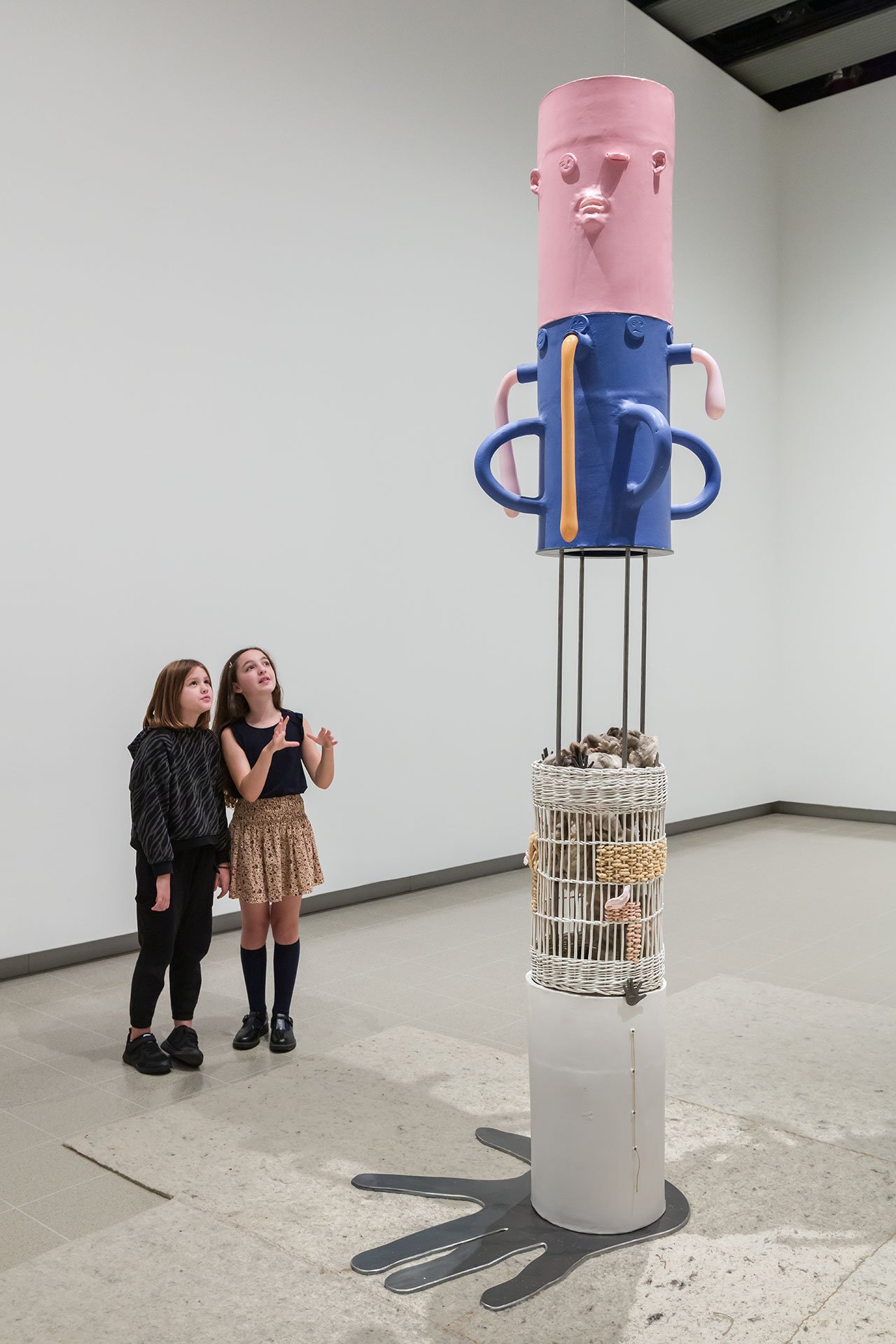
Installation view of Jonathan Baldock, Strange Clay: Ceramics in Contemporary Art at the Hayward Gallery (26 October 2022 - 8 January 2023). Photo: Mark Blower. Courtesy the Hayward Gallery.
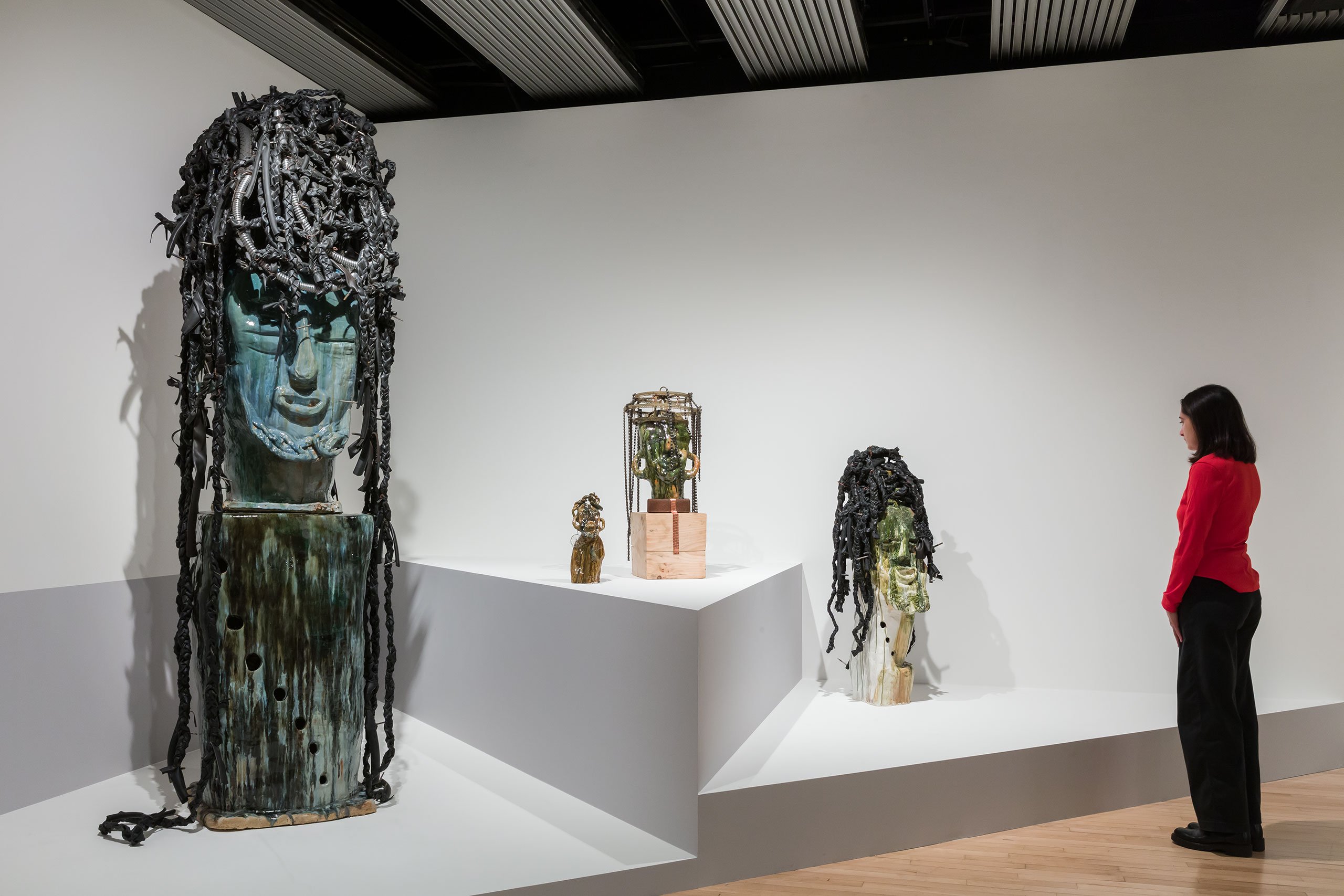
Installation view of Leilah Babirye, Strange Clay: Ceramics in Contemporary Art at the Hayward Gallery (26 October 2022 - 8 January 2023). Photo: Mark Blower. Courtesy the Hayward Gallery.
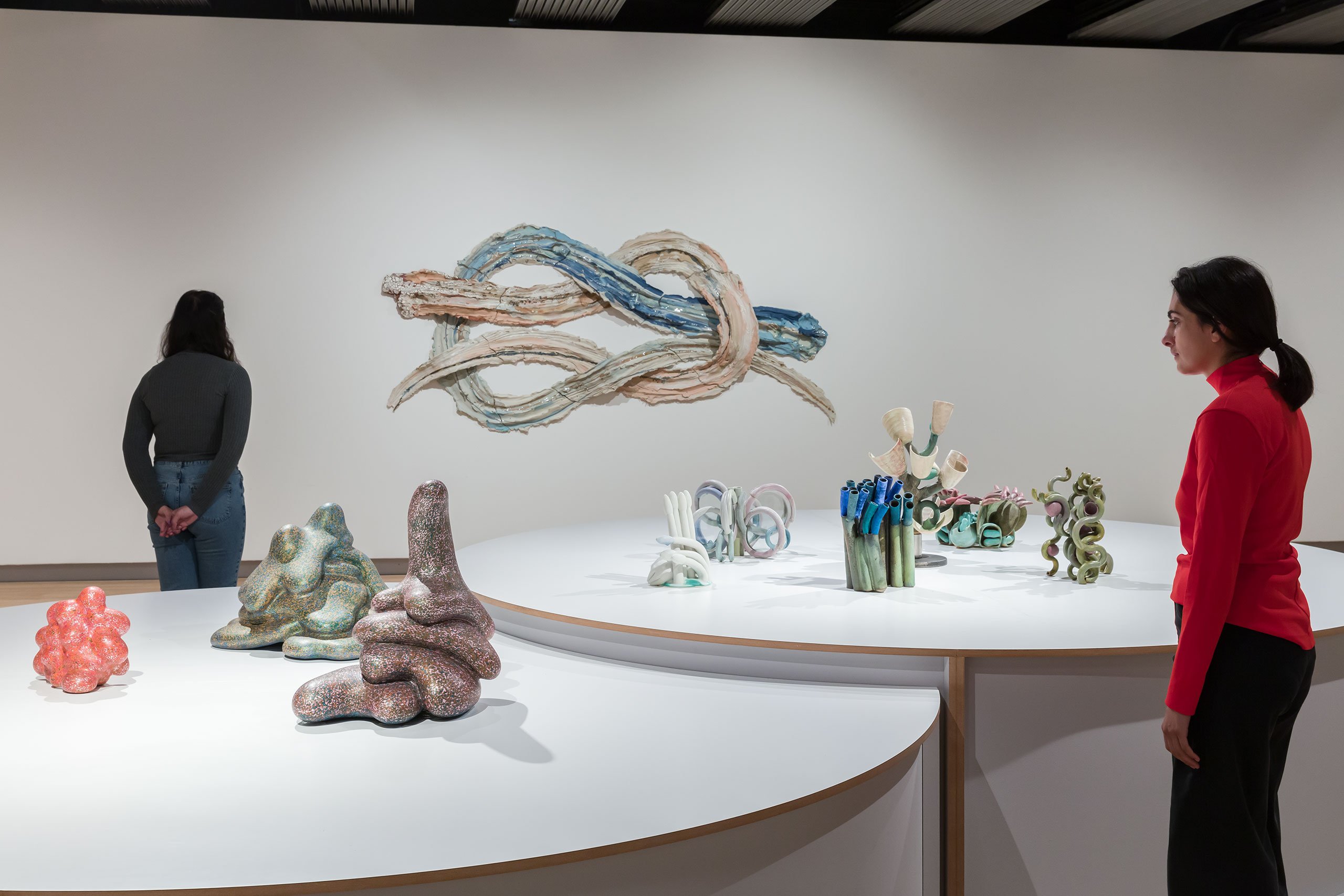
Installation view of Ken Price, Brie Ruais and Beate Kuhn, Strange Clay: Ceramics in Contemporary Art at the Hayward Gallery (26 October 2022 - 8 January 2023). Photo: Mark Blower. Courtesy the Hayward Gallery.
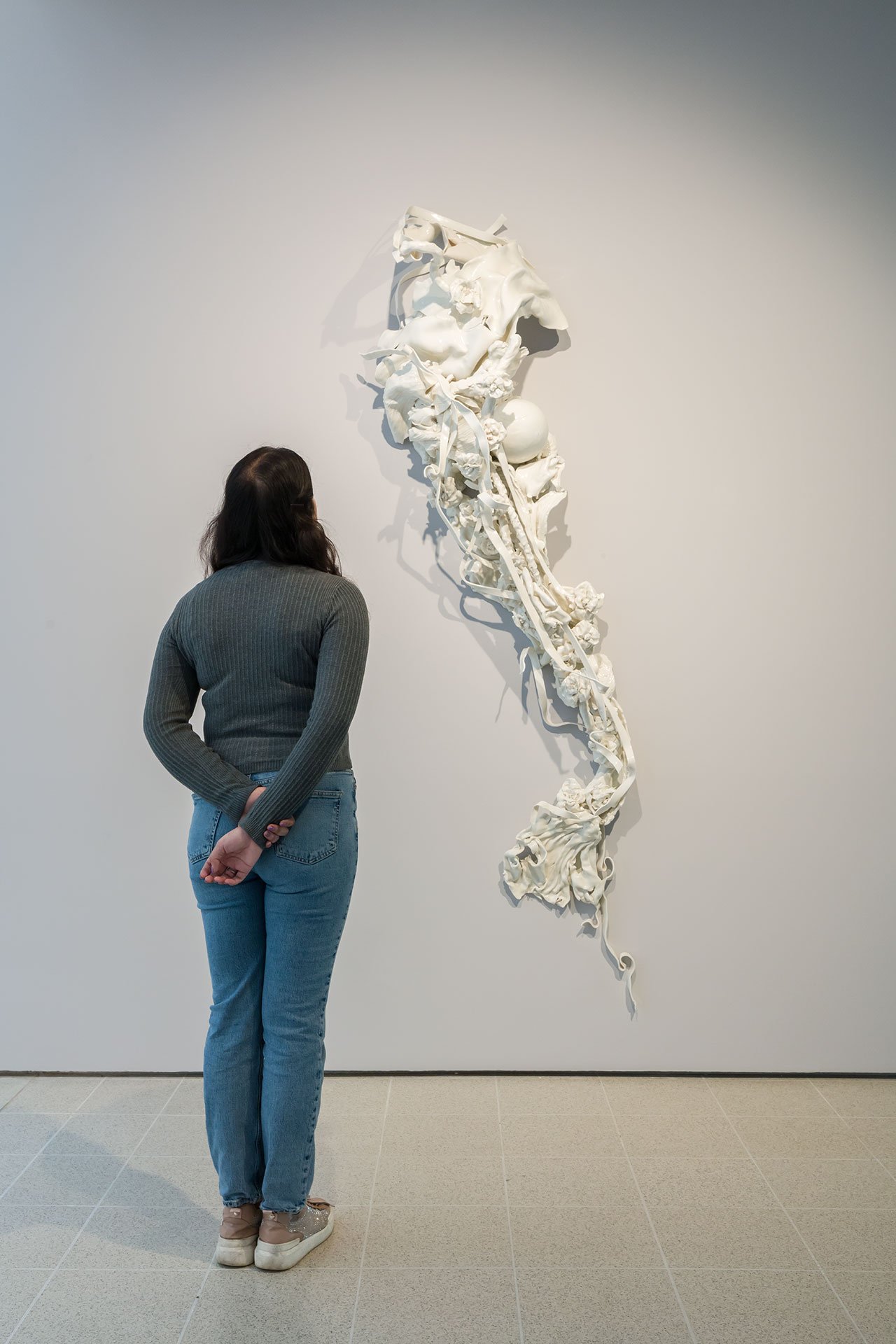
Installation view of Rachel Kneebone, Strange Clay: Ceramics in Contemporary Art at the Hayward Gallery (26 October 2022 - 8 January 2023). Photo: Mark Blower. Courtesy the Hayward Gallery.
Greeting visitors, Jonathan Baldock’s “Facecrime” (2019) is a collection of monumental columns fashioned out of glazed ceramic that at first glance resemble giant building blocks in a children’s game. On closer look however, the boldly coloured cylindrical components reveal protruding hands, ears, mouths and even bellybuttons and a variety of inscribed emojis, as well as wicket inserts. Inspired by the discovery in 1974 of more than a thousand perfectly preserved clay tablets inscribed in cuneiform in the ancient city of Ebia, Syria, that date back to 2,500 BC, Baldock’s installation explores modern forms of communication paradoxically through traditional skills of pottery and basketry.
Salvatore Arancio’s poetically titled installation “It Was Only a Matter of Time Before We Found the Pyramid and Forced it Open” (2017) also features tall columns, in this case taking the form of phallic poles swathed in iridescent, metallic glazes. Informed by the petrified trees of the Lava Trees State Park in Hawaii, the glistening poles emerge from mounds of volcanic rocks with the aim to create a link to Arancio’s “ongoing fascination about nature as a theatre for rituals, worships and self-induced trance states”.
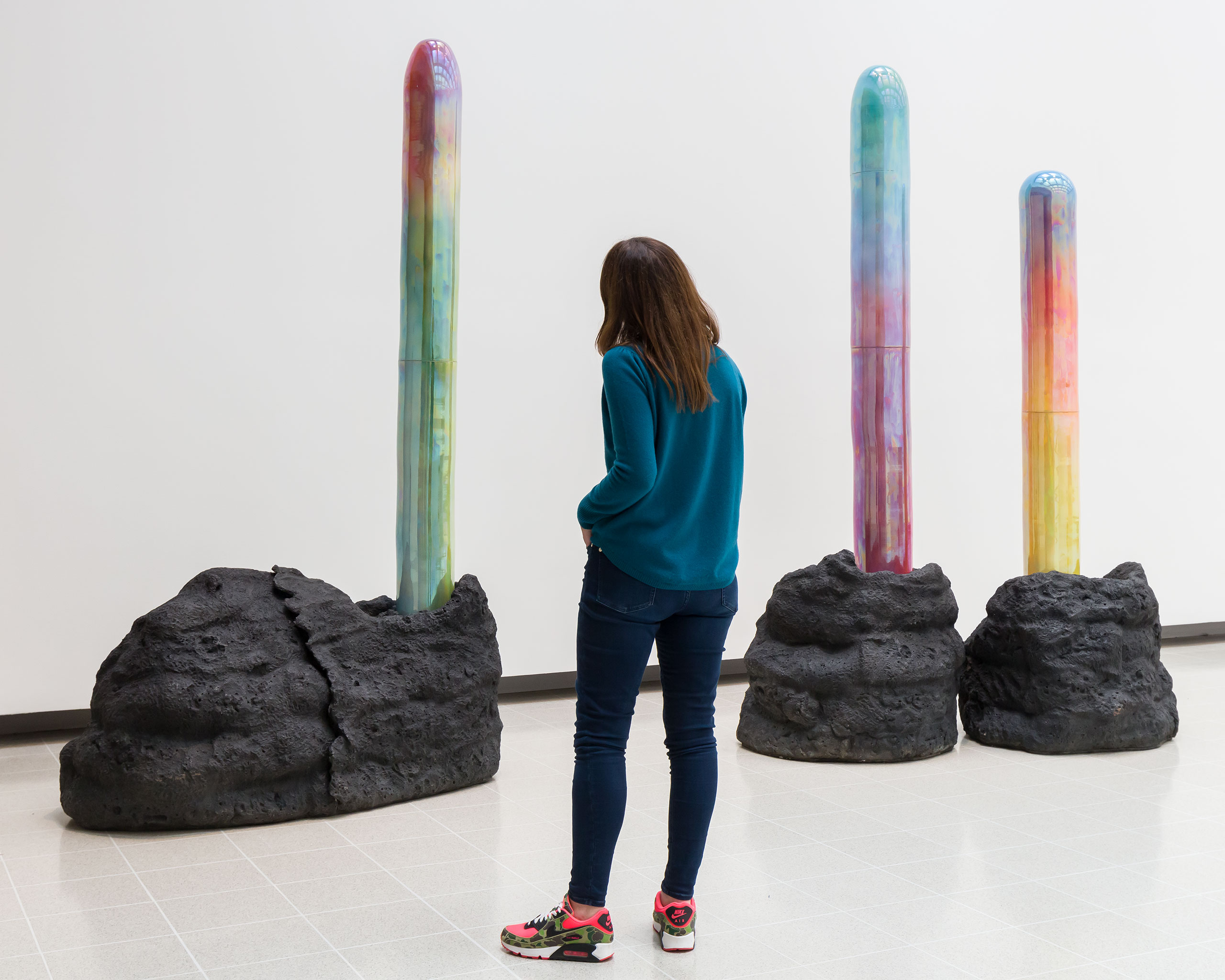
Installation view of Salvatore Arancio, Strange Clay: Ceramics in Contemporary Art at the Hayward Gallery (26 October 2022 - 8 January 2023). Photo: Mark Blower. Courtesy the Hayward Gallery.
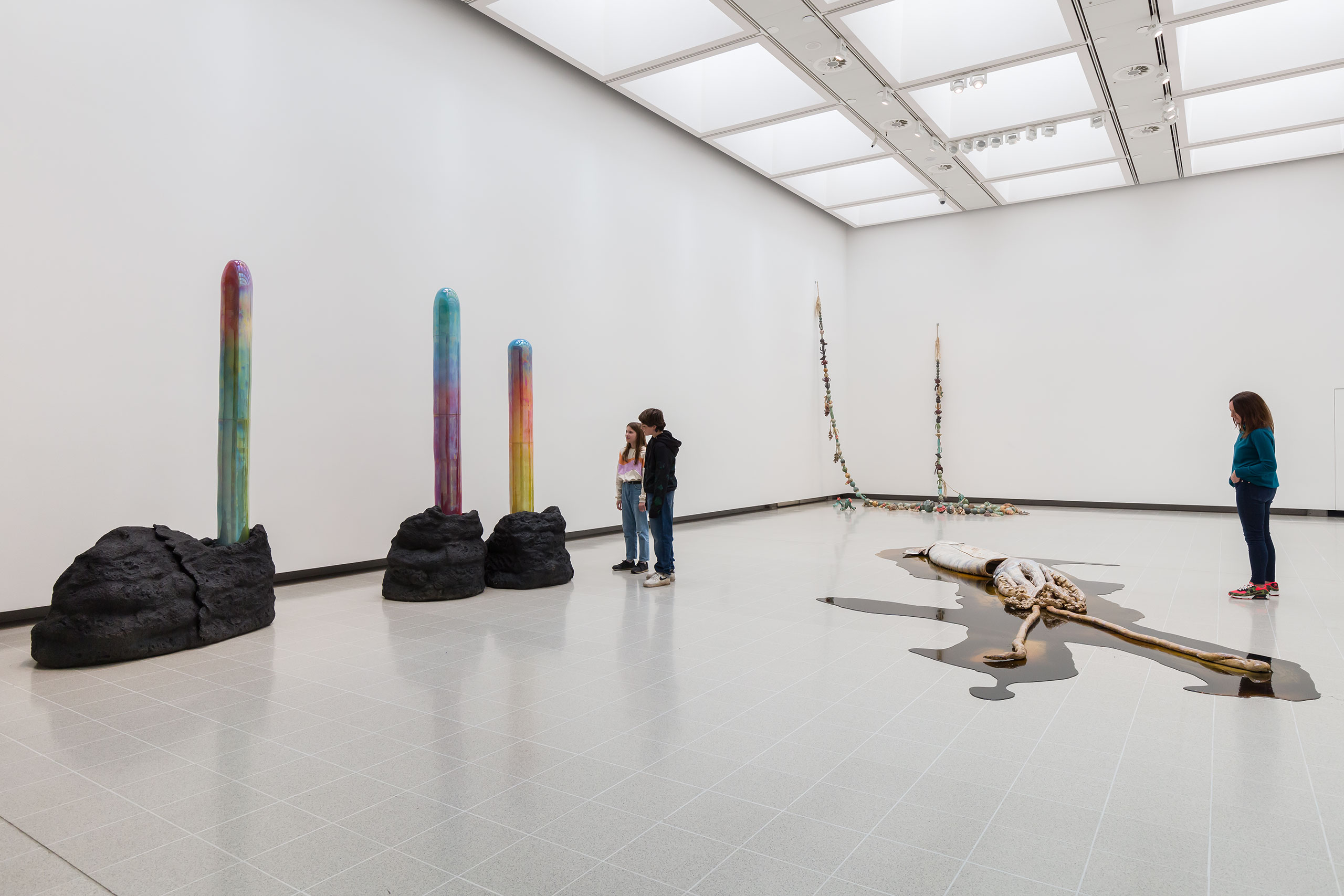
Installation view of Salvatore Arancio, Serena Korda and David Zink Yi, Strange Clay: Ceramics in Contemporary Art at the Hayward Gallery (26 October 2022 - 8 January 2023). Photo: Mark Blower. Courtesy the Hayward Gallery.
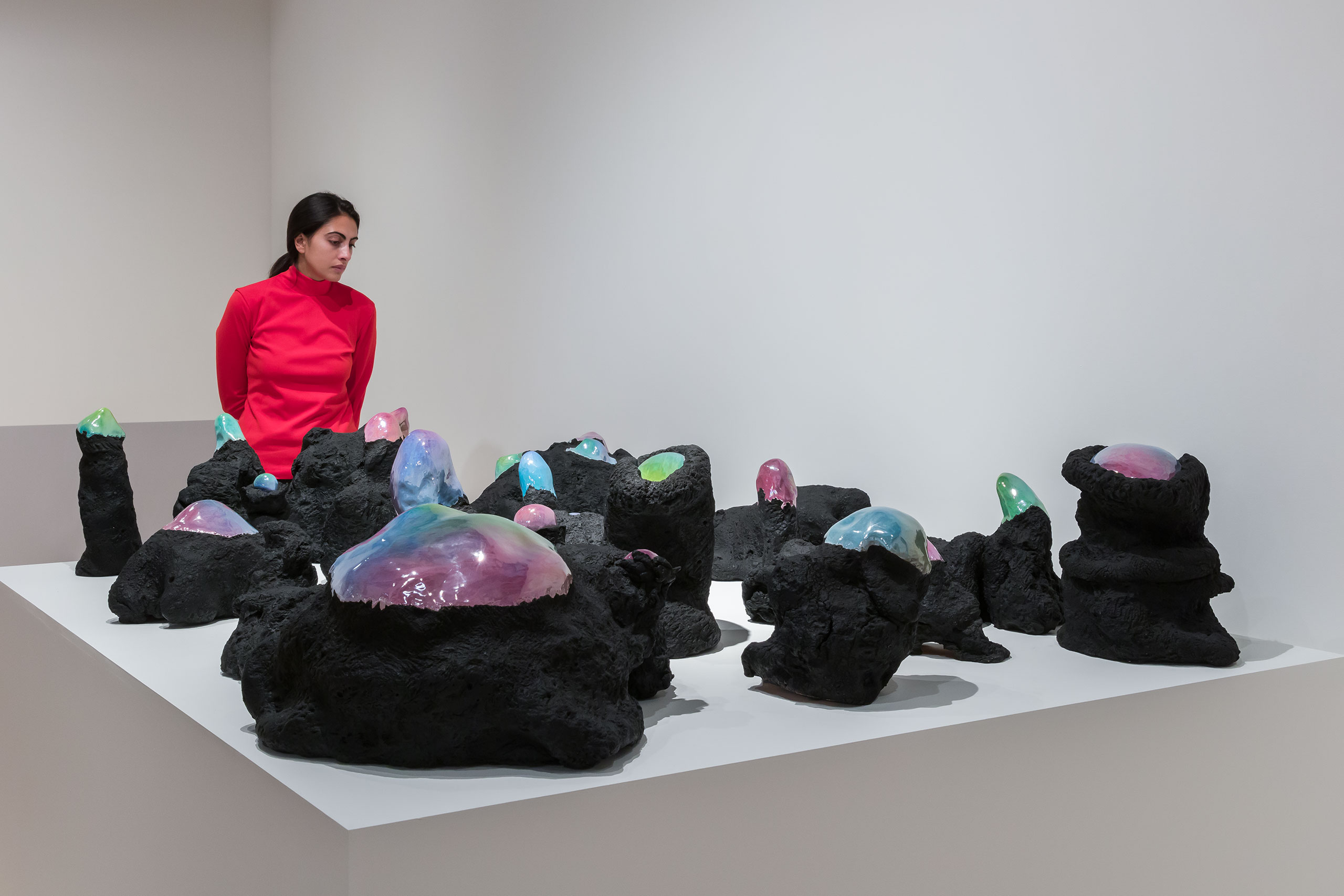
Installation view of Salvatore Arancio, Strange Clay: Ceramics in Contemporary Art at the Hayward Gallery (26 October 2022 - 8 January 2023). Photo: Mark Blower. Courtesy the Hayward Gallery.
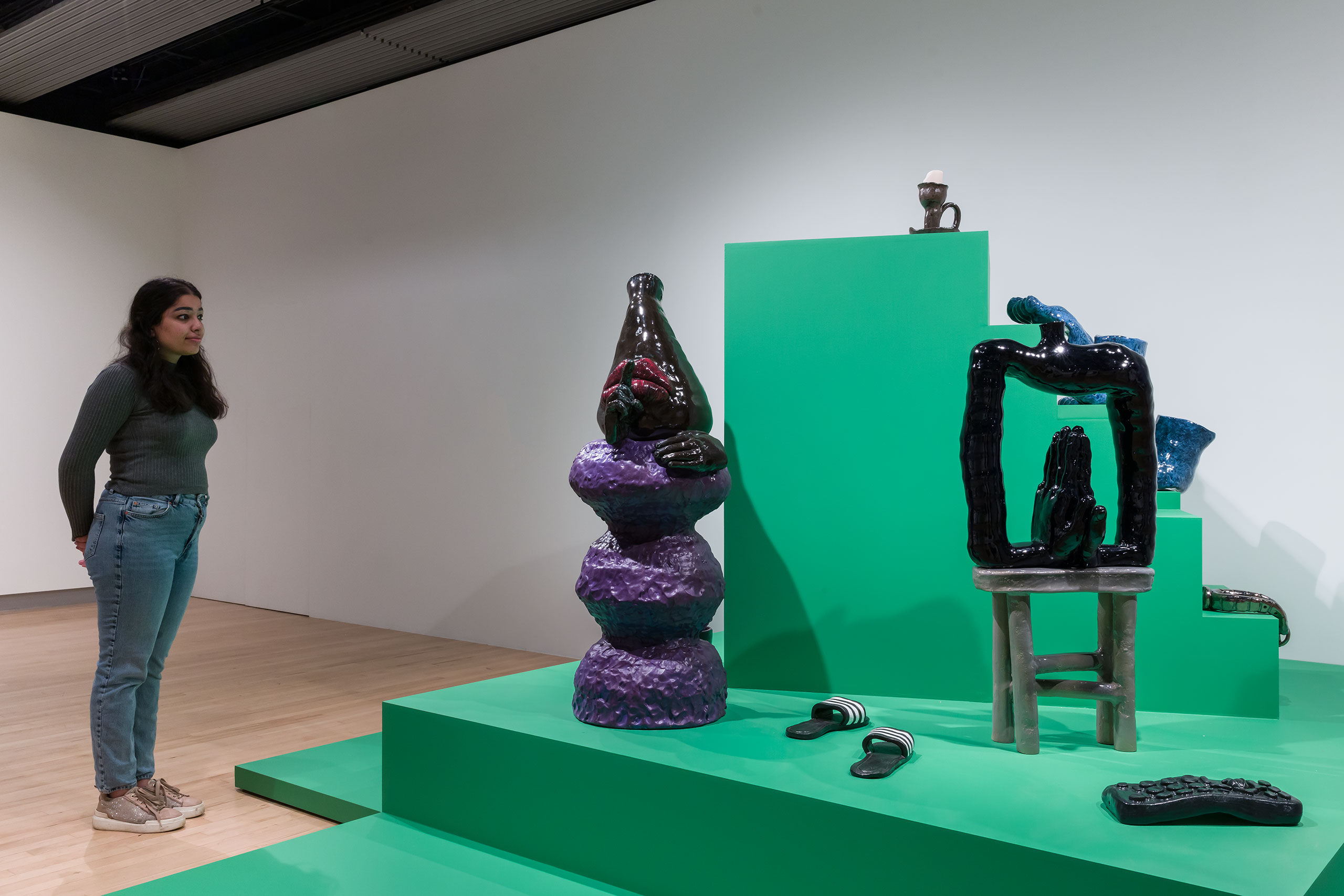
Installation view of Woody De Othello, Strange Clay: Ceramics in Contemporary Art at the Hayward Gallery (26 October 2022 - 8 January 2023). Photo: Mark Blower. Courtesy the Hayward Gallery.
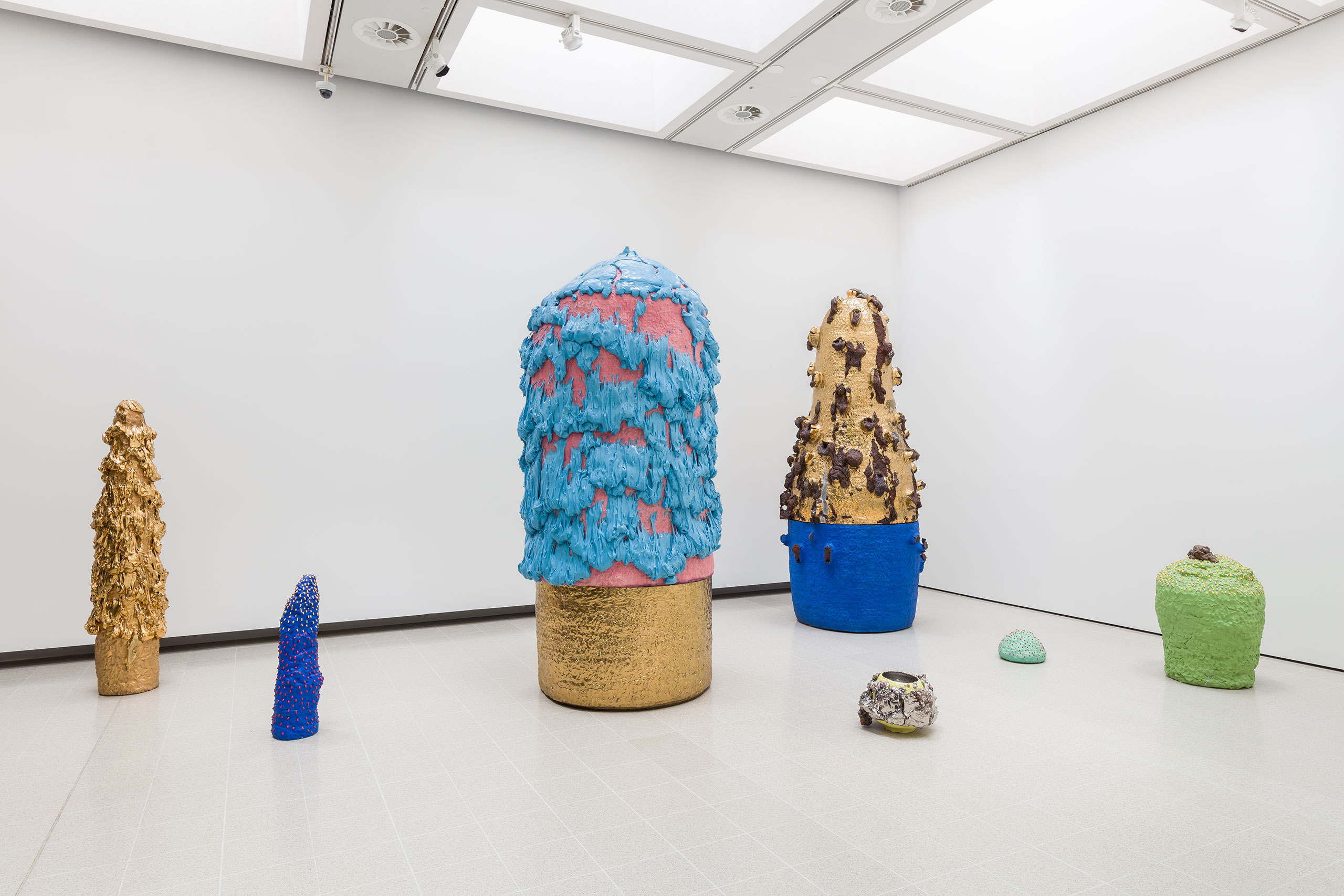
Installation view of Takuro Kuwata, Strange Clay: Ceramics in Contemporary Art at the Hayward Gallery (26 October 2022 - 8 January 2023). Photo: Mark Blower. Courtesy the Hayward Gallery.
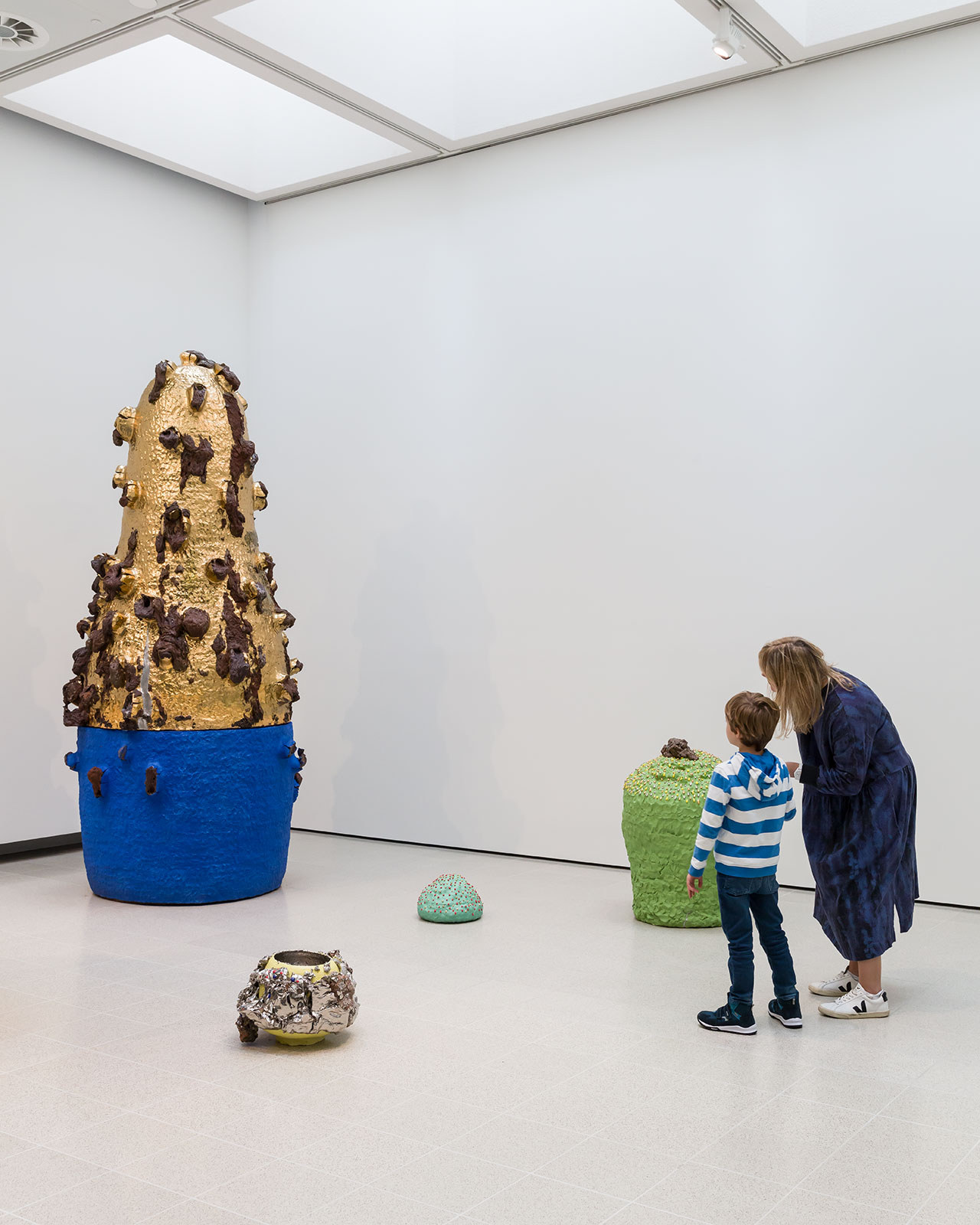
Installation view of Takuro Kuwata, Strange Clay: Ceramics in Contemporary Art at the Hayward Gallery (26 October 2022 - 8 January 2023). Photo: Mark Blower. Courtesy the Hayward Gallery.
Some of the most startling and awe-striking exhibits are undoubtedly the surreal sculptures of Hiroshima-born Takuro Kuwata which look like giant radioactive fruits or otherworldly crustaceans. Based on a contemporary take on Wabi-sabi, Kuwata’s creations celebrate imperfect beauty and natural forms while pushing the boundaries of ceramic making. Many pieces of his work, like those on display, are coated with an extremely thick glaze that explodes when baked in the kiln; other experimental techniques include adding stones to the clay mix which burst and puncture the outer layer when fired, and applying needles to catch the glaze as it melts over the surface of the pieces. Referencing Japanese tea bowls used to prepare and consume tea in traditional ceremonies, Kuwata’s pieces are ominously disquieting but arrestingly beautiful thanks to vivid Pop Art colours and a lavish use of gilding. As the artist has previously said of his work: “Beside of being just colourful, I fundamentally aim to create a work which the viewer feels ‘something’ from it”.
Like Kuwata, Chinese artist Liu Jianhua also incorporates traditional skills in his experimental practice. His installation “Regular Fragile” (2002-2003) also shares Kuwata’s mix of playfulness with apprehension; thousands of everyday objects cascading down the gallery walls and piling up on the floor recall, according to the artist, the detritus found after a plane crash. Ranging from handbags, hats, and high-heel boots to bananas, hot-water bottles, guns and teddy bears, most of the objects were donated by the artist’s friends and family and recast in white porcelain. Standing amid the installation’s peaceful cacophony, you can help but contemplate the deceptive fulfilment that our consumerist lives offer us.
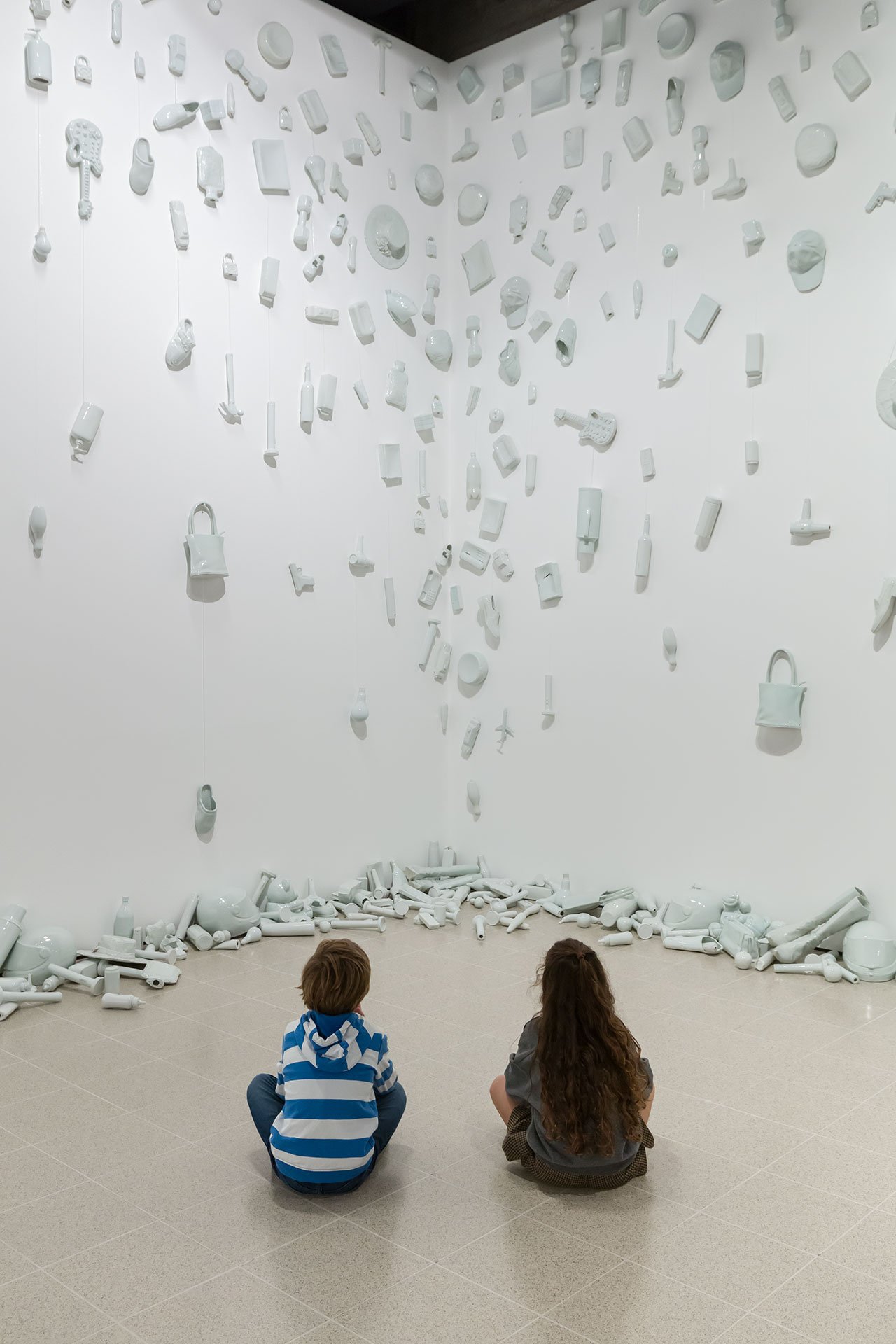
Installation view of Liu Jianhua, Strange Clay: Ceramics in Contemporary Art at the Hayward Gallery (26 October 2022 - 8 January 2023). Photo: Mark Blower. Courtesy the Hayward Gallery.
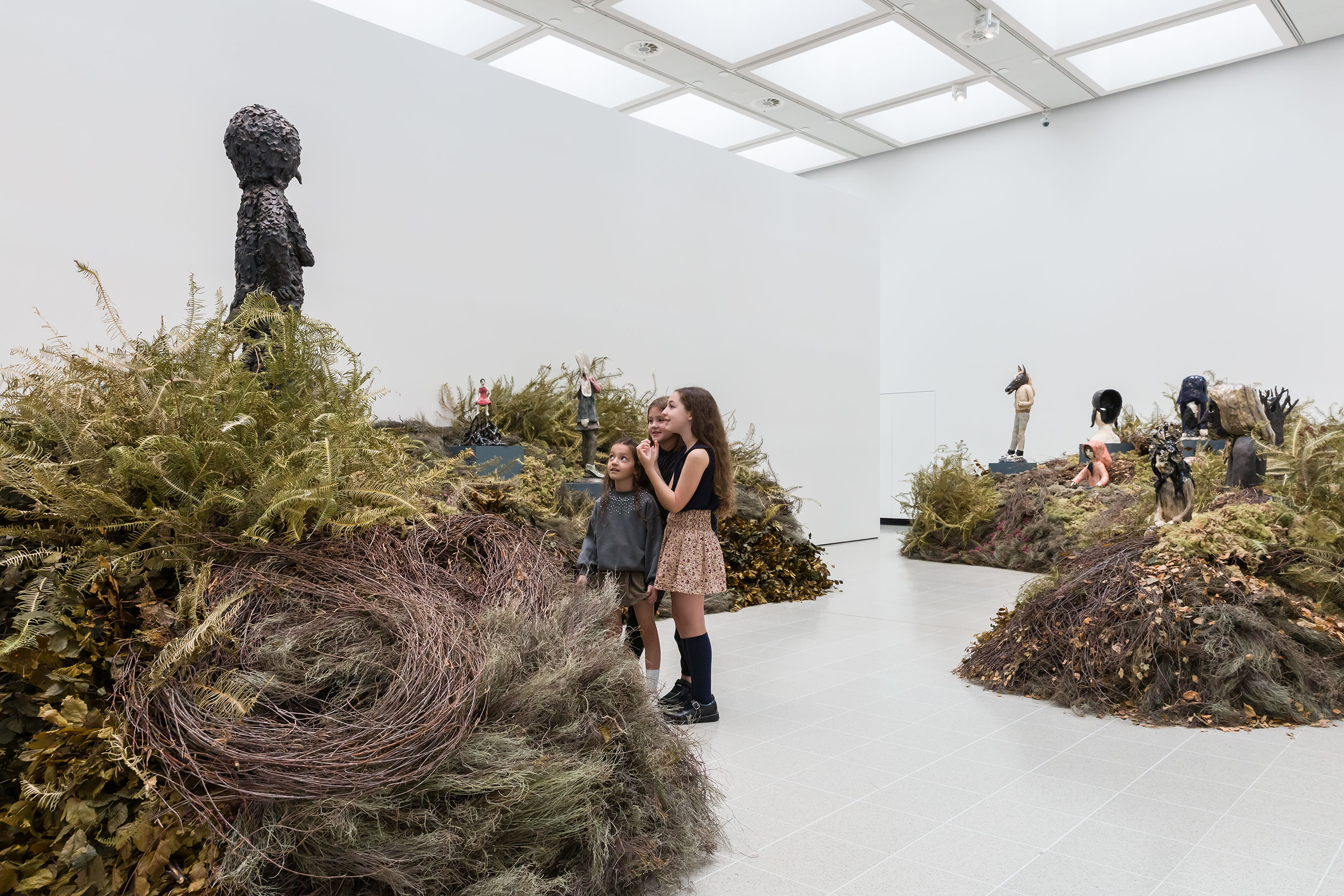
Installation view of Klara Kristalova, Strange Clay: Ceramics in Contemporary Art at the Hayward Gallery (26 October 2022 - 8 January 2023). Photo: Mark Blower. Courtesy the Hayward Gallery.
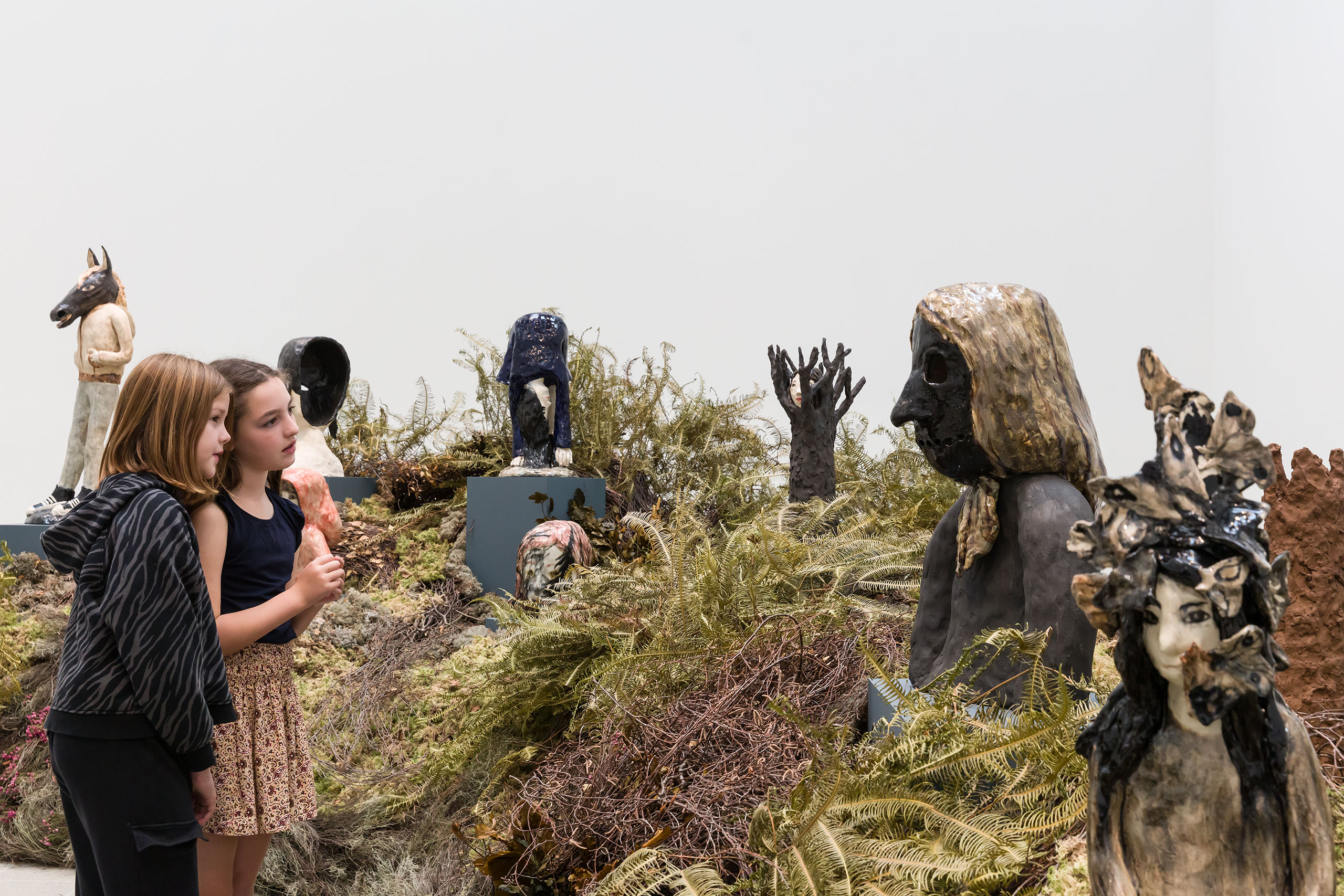
Installation view of Klara Kristalova, Strange Clay: Ceramics in Contemporary Art at the Hayward Gallery (26 October 2022 - 8 January 2023). Photo: Mark Blower. Courtesy the Hayward Gallery.
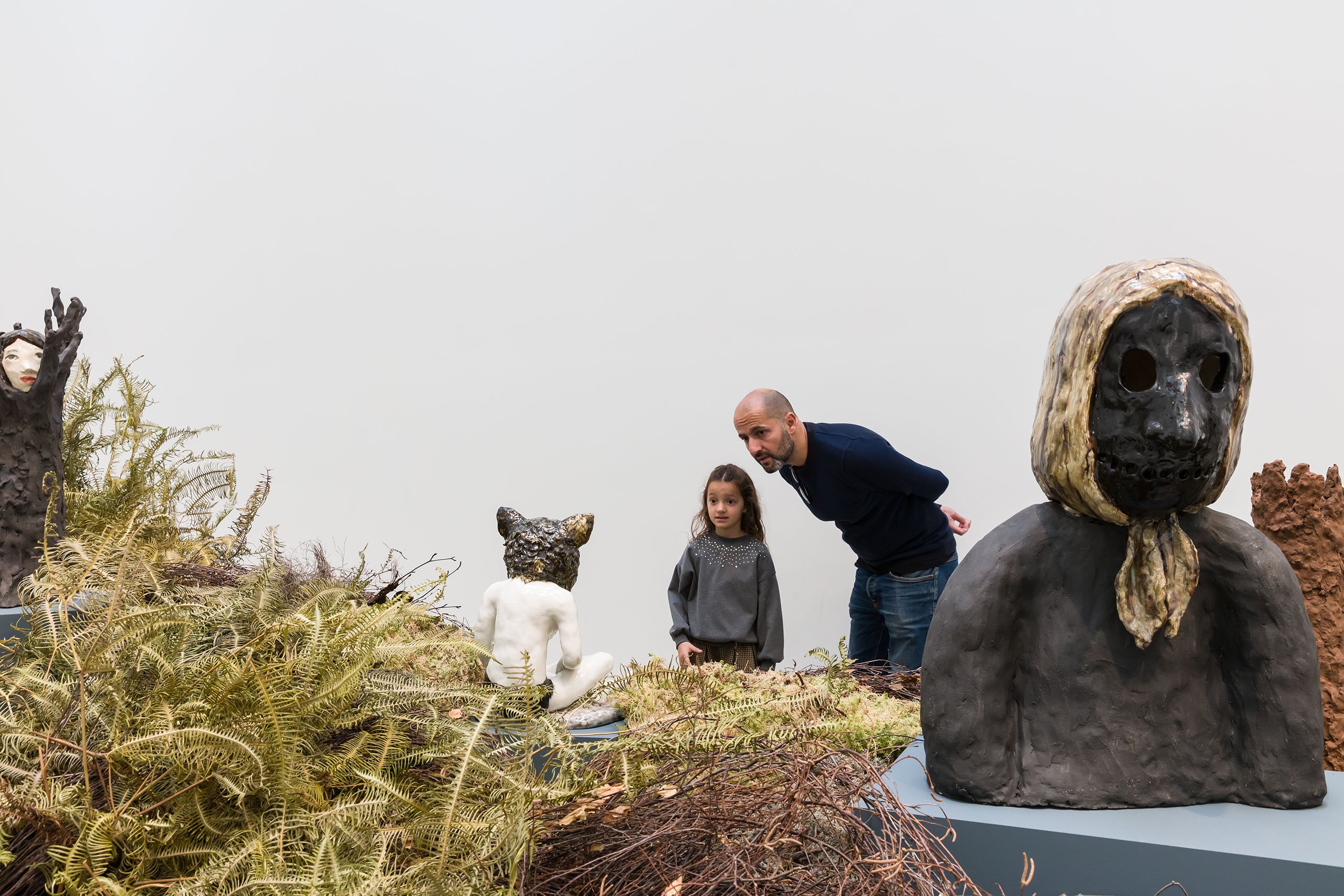
Installation view of Klara Kristalova, Strange Clay: Ceramics in Contemporary Art at the Hayward Gallery (26 October 2022 - 8 January 2023). Photo: Mark Blower. Courtesy the Hayward Gallery.
Another immersive installation is Czech-born, Sweden-based artist Klara Kristalova’s “Camouflage” (2017), a lush natural setting of roots, moss, grass and branches, populated with large-scale hybrid porcelain creatures. Drawing on folklore and mythology, Kristalova’s chimeric creatures range from horse-headed men and peasant women to ghostly forest sprites.
Showcasing the artist’s exceptional skill in modelling and glazing, David Zink Yi’s giant five-metre-long squid, “Untitled (Architeuthis)” (2010), disturbingly displayed on the floor in a pool of its own ink, explores the relationship between myth-making and the construction of identity; most of all however, it elicits strong emotions.
As realistically rendered and as ominous, Lindsey Mendick’s “Till Death Do Us Part” (2022) welcomes visitors into a rat, insect and octopus-infested domestic setting (the latter emerging through the toilet bowl). Meticulously detailed, from the toaster, utensils and leftovers in the kitchen, to the copy of OK Magazine overrun with slugs in the living room, to angry sticky notes strewn on the staircase landing, the grotesque installation is both thoroughly appalling and viscerally enticing - even more so because everything apart from the large pieces of furniture is made out of clay – presenting an evocative representation of the emotional turmoil of cohabitation.
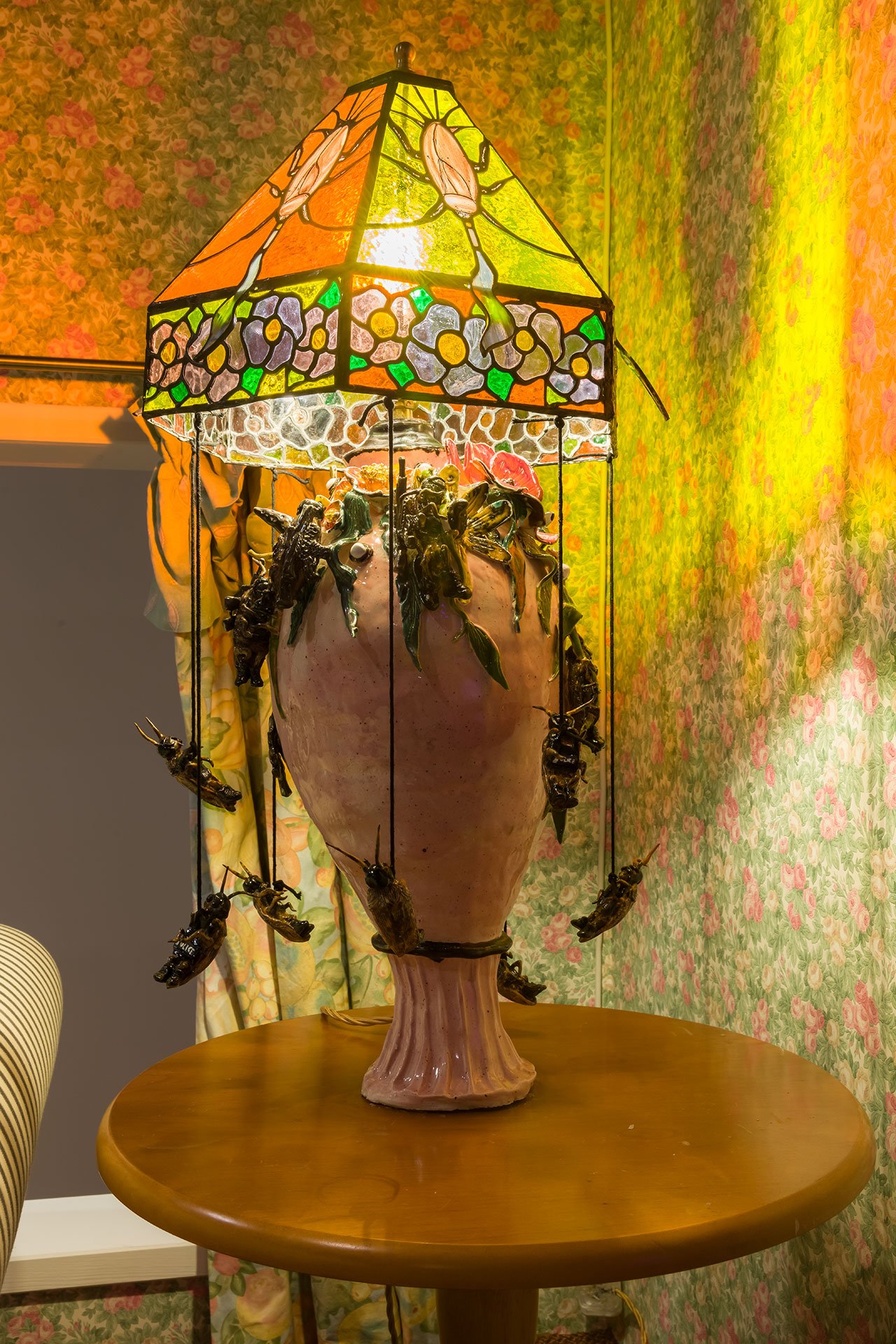
Installation view of Lindsey Mendick, Strange Clay: Ceramics in Contemporary Art at the Hayward Gallery (26 October 2022 - 8 January 2023). Photo: Mark Blower. Courtesy the Hayward Gallery.

Installation view of Lindsey Mendick, Strange Clay: Ceramics in Contemporary Art at the Hayward Gallery (26 October 2022 - 8 January 2023). Photo: Mark Blower. Courtesy the Hayward Gallery.
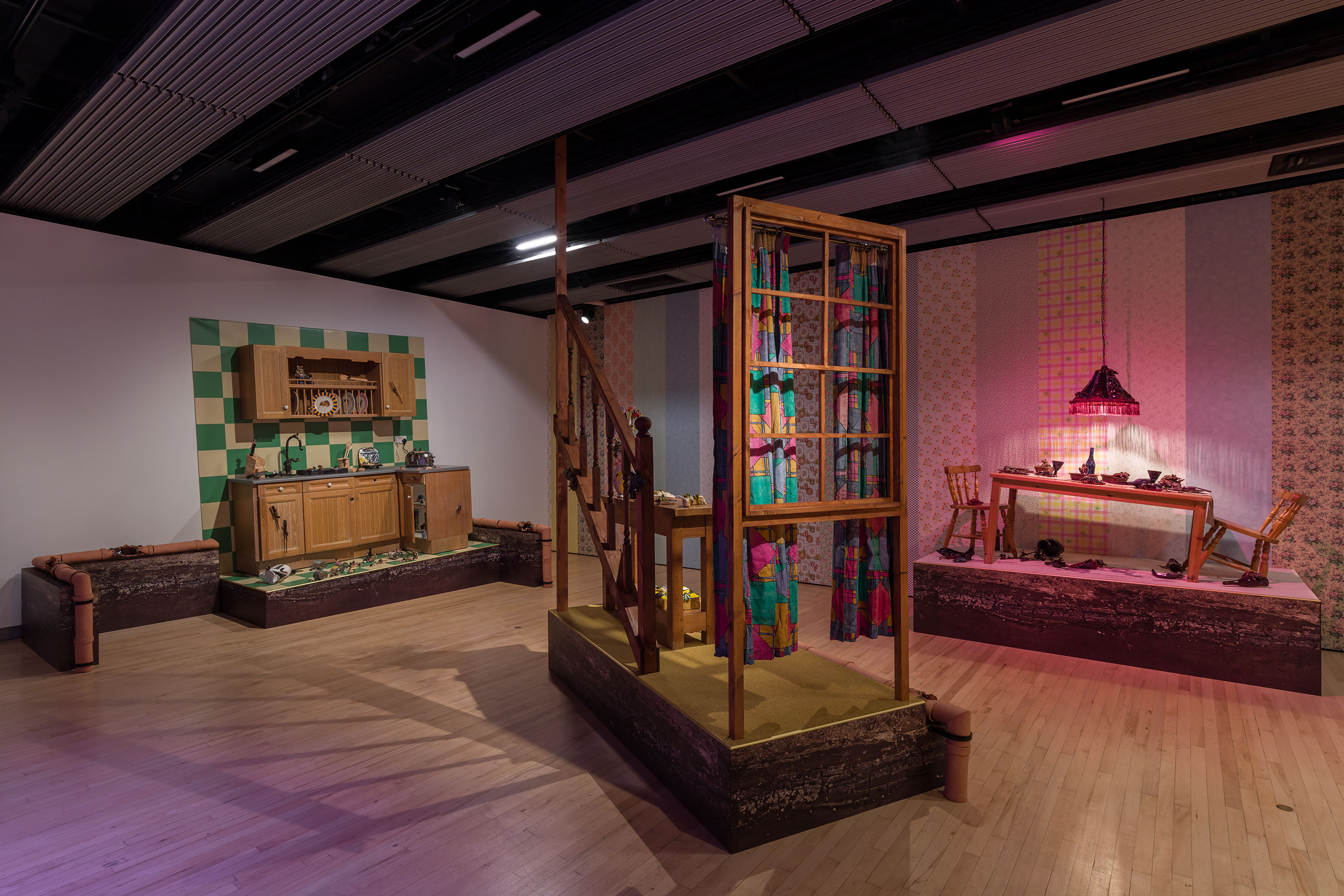
Installation view of Lindsey Mendick, Strange Clay: Ceramics in Contemporary Art at the Hayward Gallery (26 October 2022 - 8 January 2023). Photo: Mark Blower. Courtesy the Hayward Gallery.

Installation view of Lindsey Mendick, Strange Clay: Ceramics in Contemporary Art at the Hayward Gallery (26 October 2022 - 8 January 2023). Photo: Mark Blower. Courtesy the Hayward Gallery.
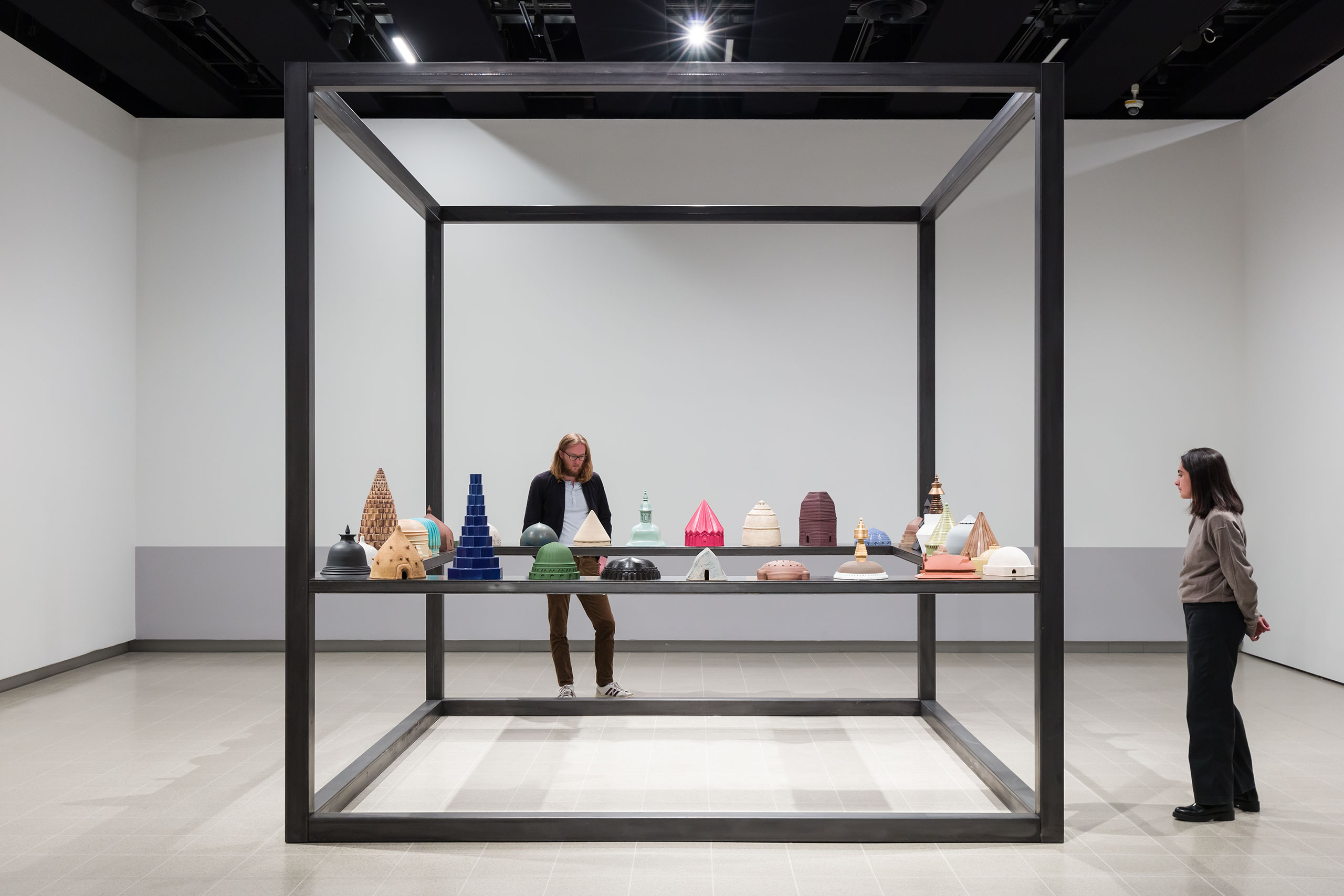
Installation view of Shahpour Pouyan, Strange Clay: Ceramics in Contemporary Art at the Hayward Gallery (26 October 2022 - 8 January 2023). Photo: Mark Blower. Courtesy the Hayward Gallery.
Blurring the boundaries between ‘high art’ and ‘craft’, late American artist Betty Woodman’s “House of the South” (1996), a mural-like display of hand-painted vases, pedestals and ceramic fragments, is inspired by Matisse cut-outs, while English superstar artist Grayson Perry’s mock-Victorian pots and urns showcase that decorative and utilitarian pottery are not incompatible.
Fittingly, the exhibition’s final room is taken over by Edmund de Waal’s “Atmosphere” (2014), a ghostly installation that encourages contemplation and reflection. Originally commissioned specially for the Sunley Gallery at the Turner Contemporary in Margate, overlooking the North Sea, it consists of nine horizonal plexiglass vitrines of differing opacities with an array of simple porcelain vessels looming within. Hanging ethereally above the visitors’ heads like clouds, the installation perfectly encapsulates how an earth-based medium like ceramics can nurture lofty aspirations.
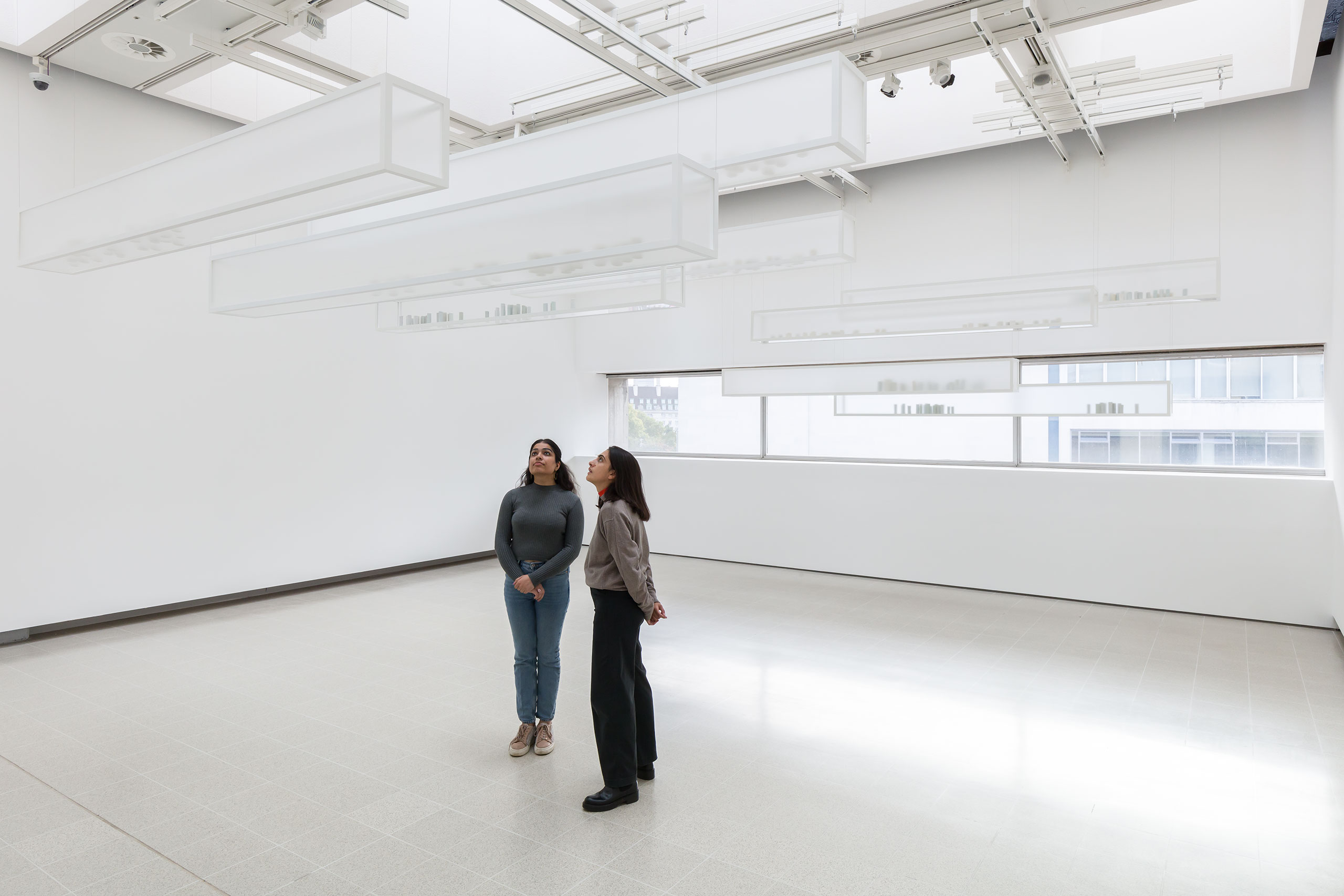
Installation view of Edmund de Waal, Strange Clay: Ceramics in Contemporary Art at the Hayward Gallery (26 October 2022 - 8 January 2023). Photo: Mark Blower. Courtesy the Hayward Gallery.
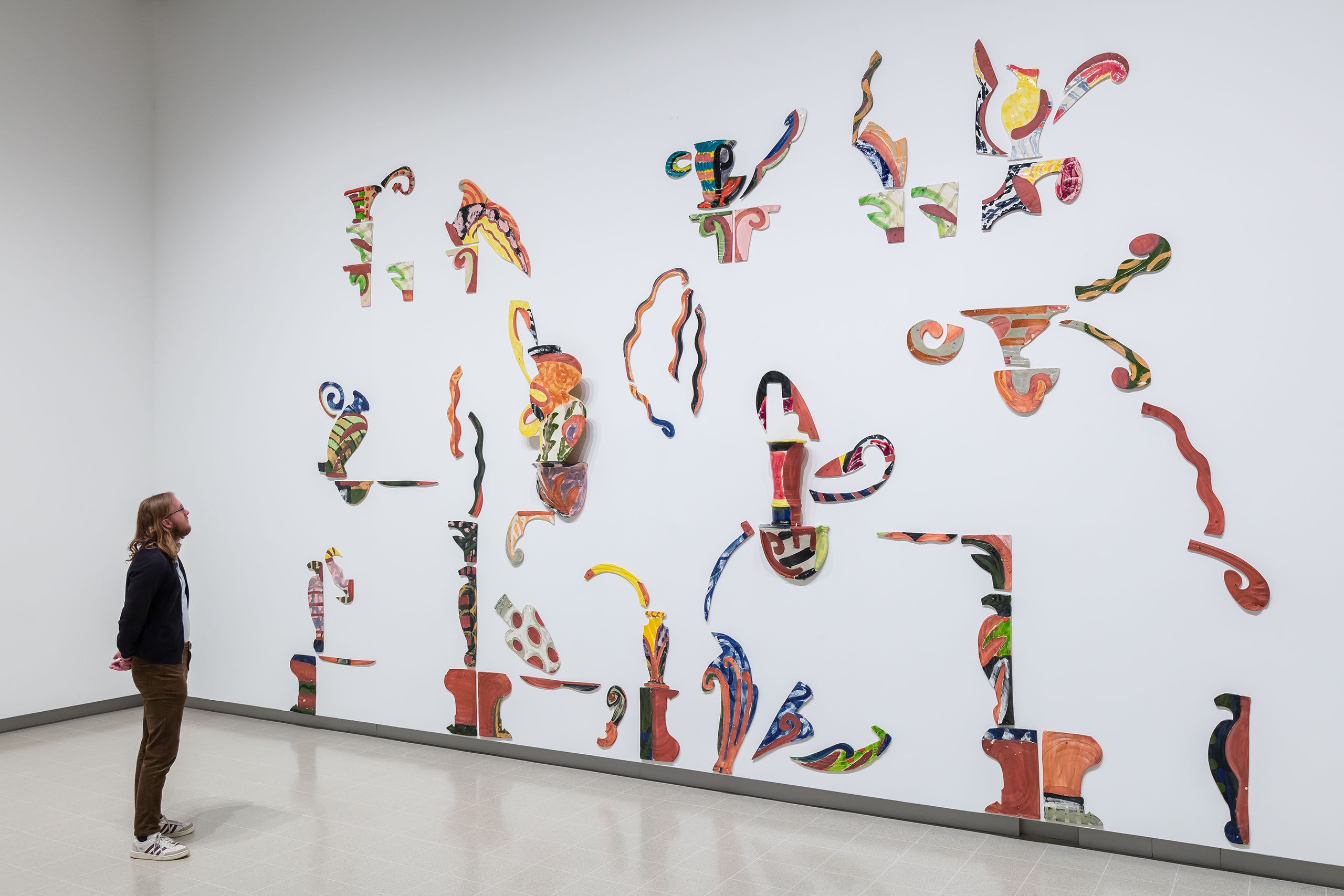
Installation view of Betty Woodman, Strange Clay: Ceramics in Contemporary Art at the Hayward Gallery (26 October 2022 - 8 January 2023). Photo: Mark Blower. Courtesy the Hayward Gallery.
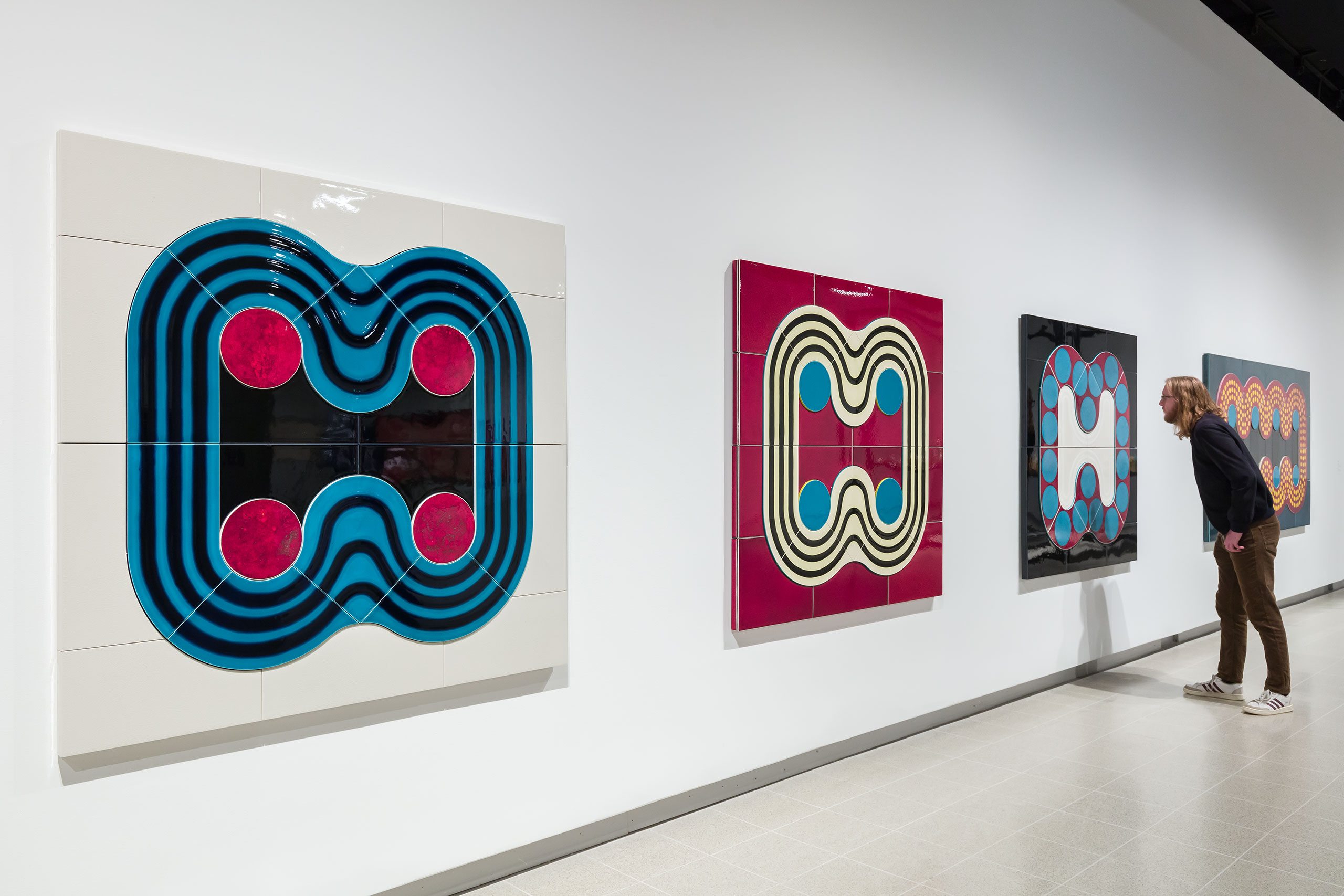
Installation view of Lubna Chowdhary, Strange Clay: Ceramics in Contemporary Art at the Hayward Gallery (26 October 2022 - 8 January 2023). Photo: Mark Blower. Courtesy the Hayward Gallery.
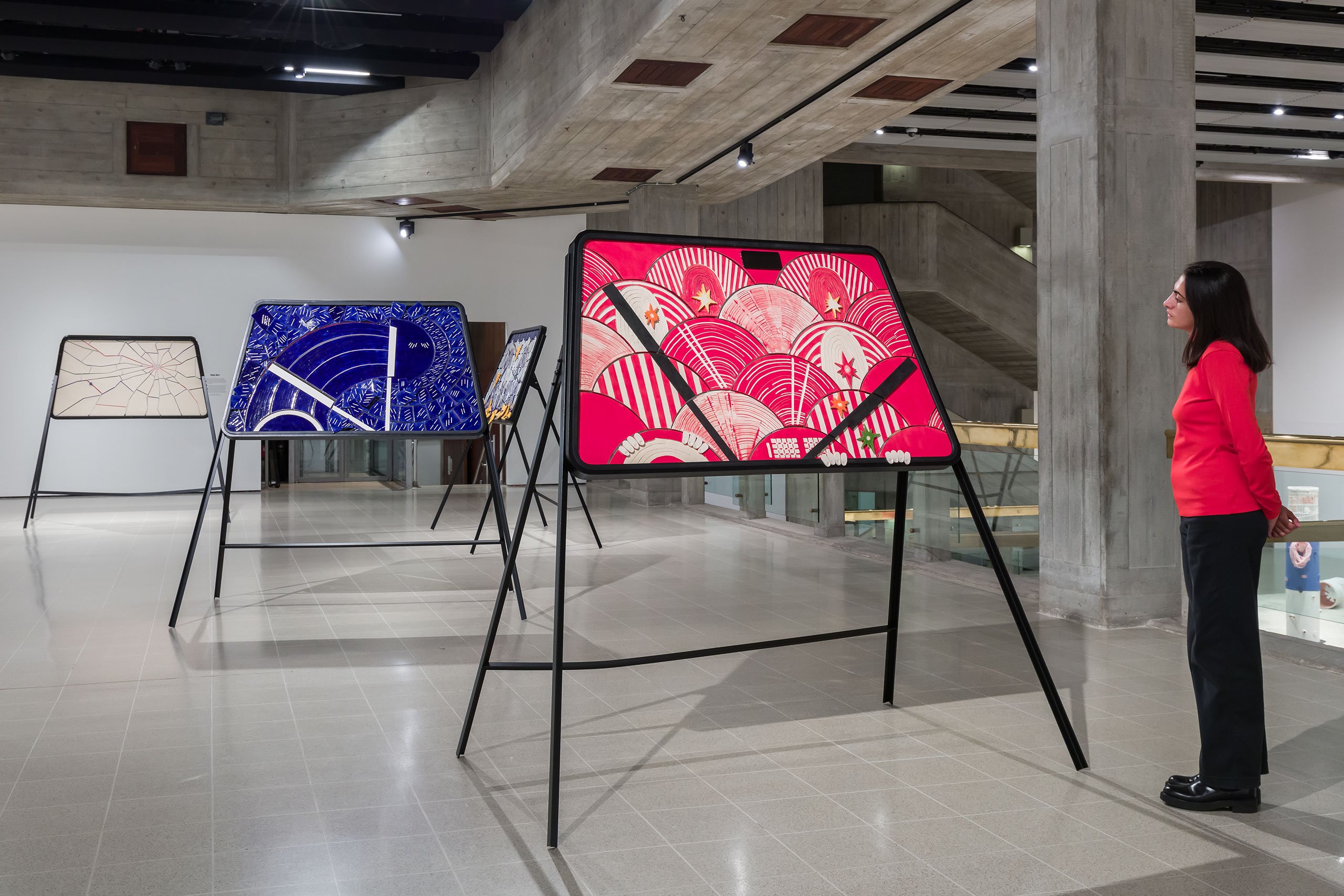
Installation view of Emma Hart, Strange Clay: Ceramics in Contemporary Art at the Hayward Gallery (26 October 2022 - 8 January 2023). Photo: Mark Blower. Courtesy the Hayward Gallery.
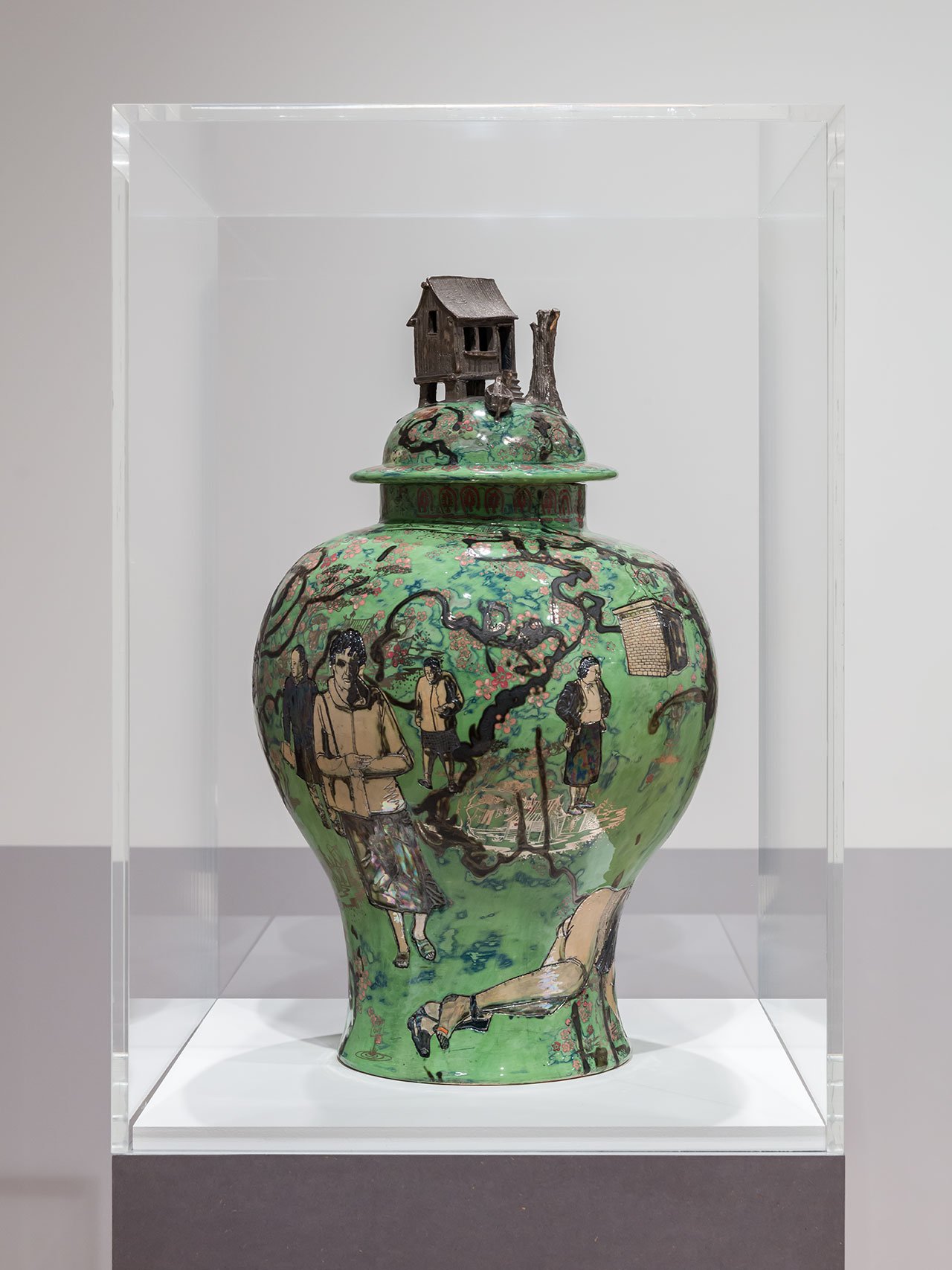
Installation view of Grayson Perry, Strange Clay: Ceramics in Contemporary Art at the Hayward Gallery (26 October 2022 - 8 January 2023). Photo: Mark Blower. Courtesy the Hayward Gallery.














